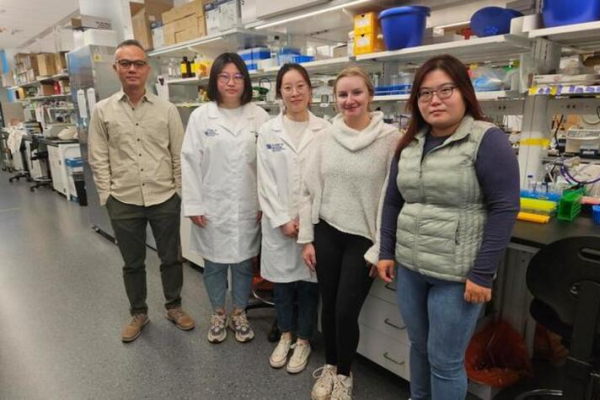Noehren Studies Muscle Injuries, Shares Findings with Community
While working as a physical therapist, Brian Noehren was frustrated by the lack of robust clinical evidence to support the interventions used in the clinic. He had ideas about what could be done differently, but he didn't have the research training to explore them.
"I wanted to come up with better strategies to address injuries that are so vexing and challenging to treat," he said.
Motived to find solutions, Noehren turned his career to translational research in physical therapy, completing his Ph.D. in biomechanics and movement science at the University of Delaware before joining the University of Kentucky's faculty five years ago. With the funding and support from the UK Center for Clinical and Translational Science and the National Institutes of Health, Noehren studies how muscle and physical function are affected by knee injuries--a significant source of disability in the United States--and how best to intervene and treat such injuries.
"I started by looking at really big picture things - after you have these injuries, do you alter the way you walk or run?" he said. "I've always been fascinated by how the human body moves. And at its heart, physical therapy is really about helping individuals improve their physical function, and one part of that is their ability to move."
His research uses MRIs and assays of muscle biopsies to examine how muscles have been altered by injury and then identify therapeutic targets. By examining the mechanisms of the altered muscle and gait function, he can develop, test, and asses new physical therapy interventions.
Noehren conducts his research with the assistance of a number of students, many of whom are undergraduates. In addition to instilling knowledge about physical therapy and research, he is also committed to helping his students develop keen critical thinking skills to look at problems from all angles.
"We devote a lot of time and resources to them - they're in essence the heart of the lab," he said. "I wish I'd had the opportunities that the students at UK have to participate in research starting at the undergraduate level. I've been so impressed with the undergrads working in our lab - they go from having a limited sense of what we do, to rapidly becoming content experts."
Twice a month, Noehren also offers a specialty running clinic with Dr. Scott Black, a UK sports medicine doctor and the physician for the UK track and field team. Noehren and Black see patients jointly, combining the expertise of physical therapy and sports medicine to offer a unique treatment resource for patients.
"Working together gives us a unique perspective on injuries and has helped with diagnosing of some of the more challenging ones," he said.
The collaborative running clinic has also helped to stimulate research ideas, and beginning this summer, the clinic will be held in the new, state-of-the-art research lab.
"This will also give people the chance to see research in action," he said. "I hope it gets the community excited about some of the unique things we have here at UK. There aren't a lot of labs that do what we do in the U.S., and for the community to use and see these resources really contributes to town-and-gown relationships."
Community engagement is a key aspect of research for Noehren, who recognizes the imperative to share his research findings with the home communities of his research participants. He operates a Facebook page to share information from the lab, and last year alone he spoke at ten community events, collaborating with the YMCA, John's Run Walk Shop and Lexmark, among others.
"It's critically important to me that the community knows who we are, that we do good work and that we are good stewards- that we're not doing this just to publish in academic journals, but to help the Commonwealth."
Credits
Produced by Alicia P. Gregory, videography/direction by Chad Rumford (Research Communications).

